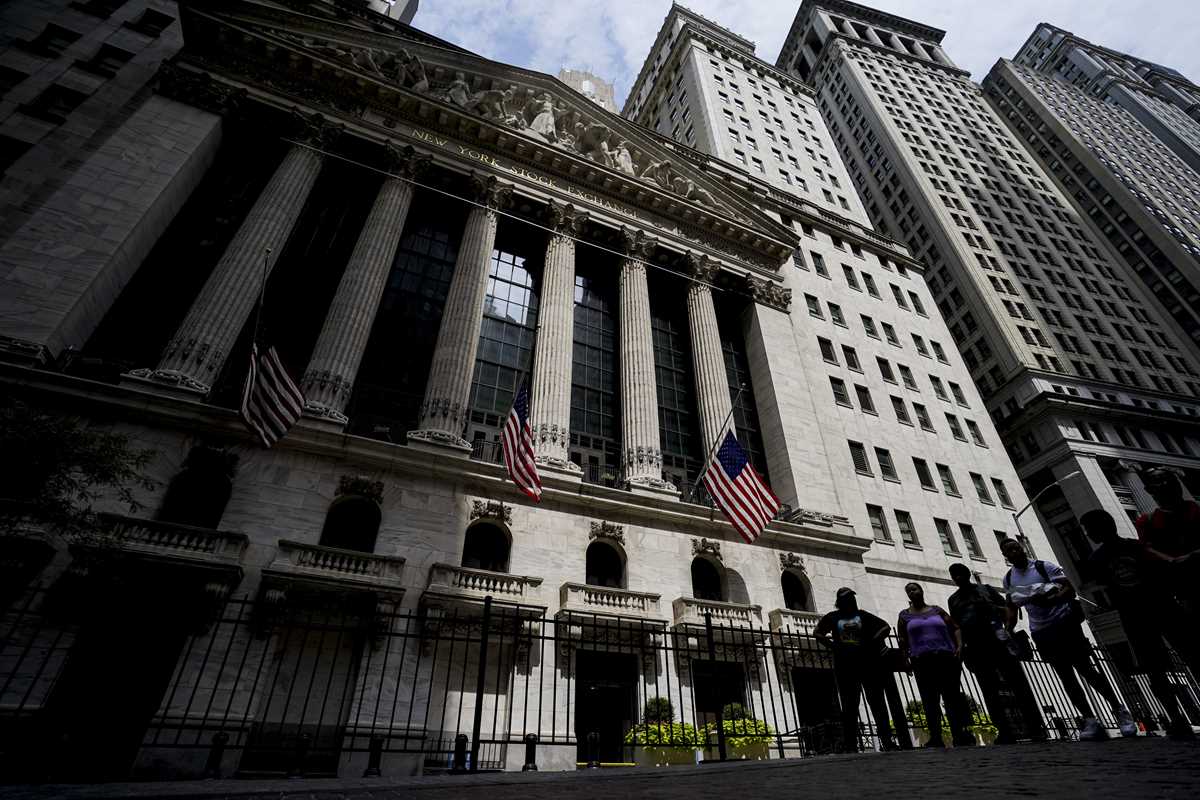 Pedestrians walk past the New York Stock Exchange, Friday, July 8, 2022, in New York. Stocks are swinging between small gains and losses as Wall Street works out what to make of surprisingly strong data on the U.S. jobs market released Friday.
(AP Photo/John Minchillo)
Pedestrians walk past the New York Stock Exchange, Friday, July 8, 2022, in New York. Stocks are swinging between small gains and losses as Wall Street works out what to make of surprisingly strong data on the U.S. jobs market released Friday.
(AP Photo/John Minchillo)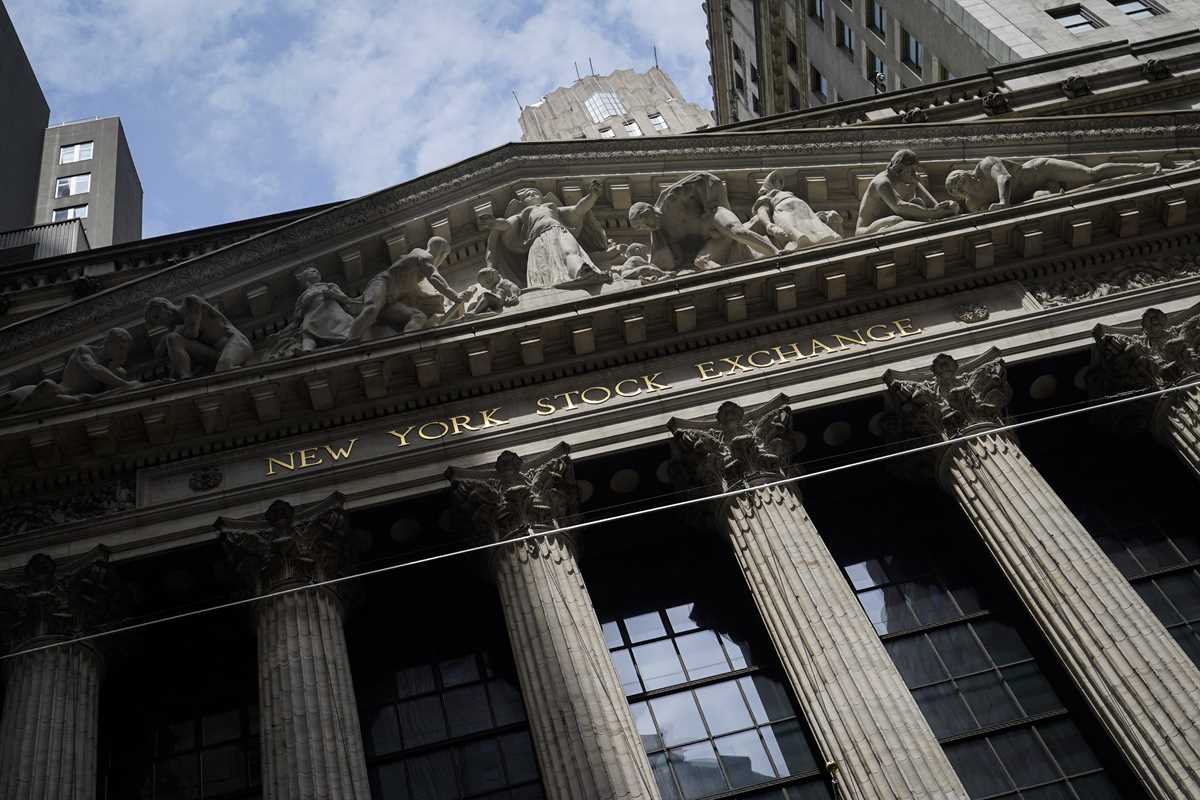 Sunlight shines on the facade of the New York Stock Exchange, Friday, July 8, 2022, in New York. Stocks are swinging between small gains and losses as Wall Street works out what to make of surprisingly strong data on the U.S. jobs market released Friday. (AP Photo/John Minchillo)
Sunlight shines on the facade of the New York Stock Exchange, Friday, July 8, 2022, in New York. Stocks are swinging between small gains and losses as Wall Street works out what to make of surprisingly strong data on the U.S. jobs market released Friday. (AP Photo/John Minchillo)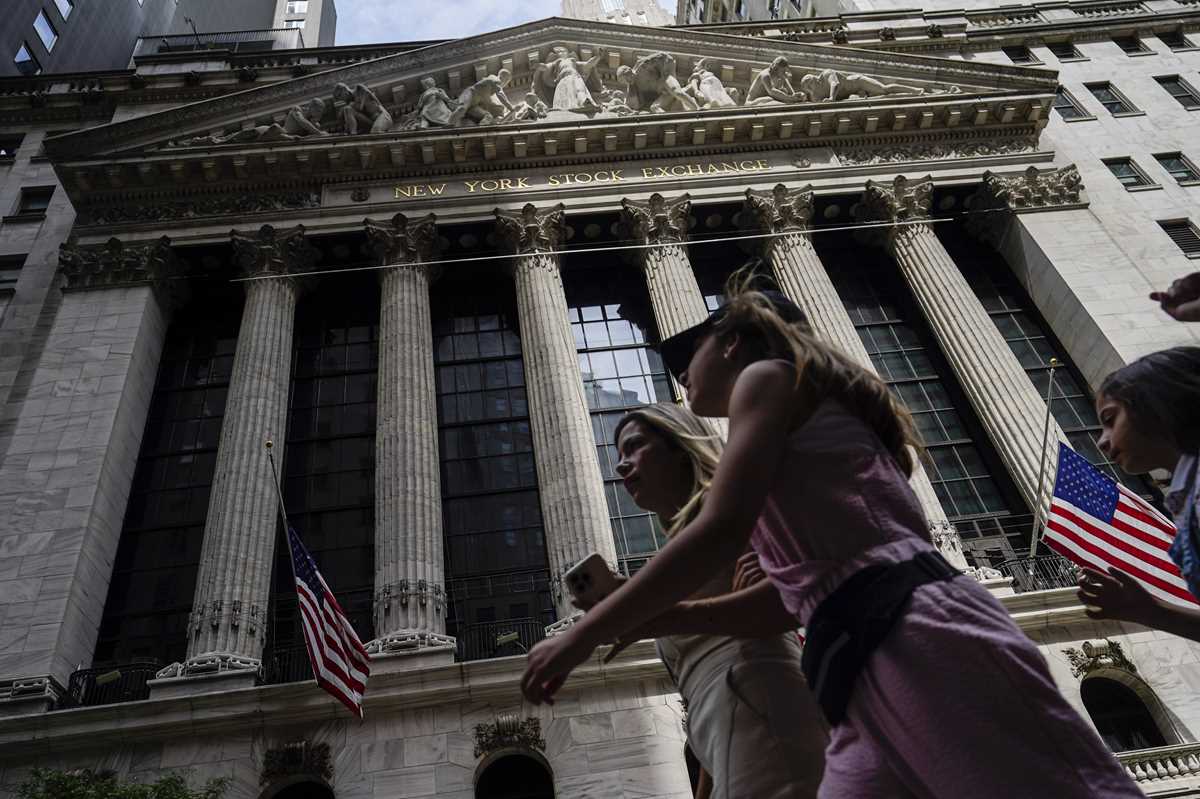 Pedestrians walk past the New York Stock Exchange, Friday, July 8, 2022, in New York. Stocks are swinging between small gains and losses as Wall Street works out what to make of surprisingly strong data on the U.S. jobs market released Friday.
(AP Photo/John Minchillo)
Pedestrians walk past the New York Stock Exchange, Friday, July 8, 2022, in New York. Stocks are swinging between small gains and losses as Wall Street works out what to make of surprisingly strong data on the U.S. jobs market released Friday.
(AP Photo/John Minchillo)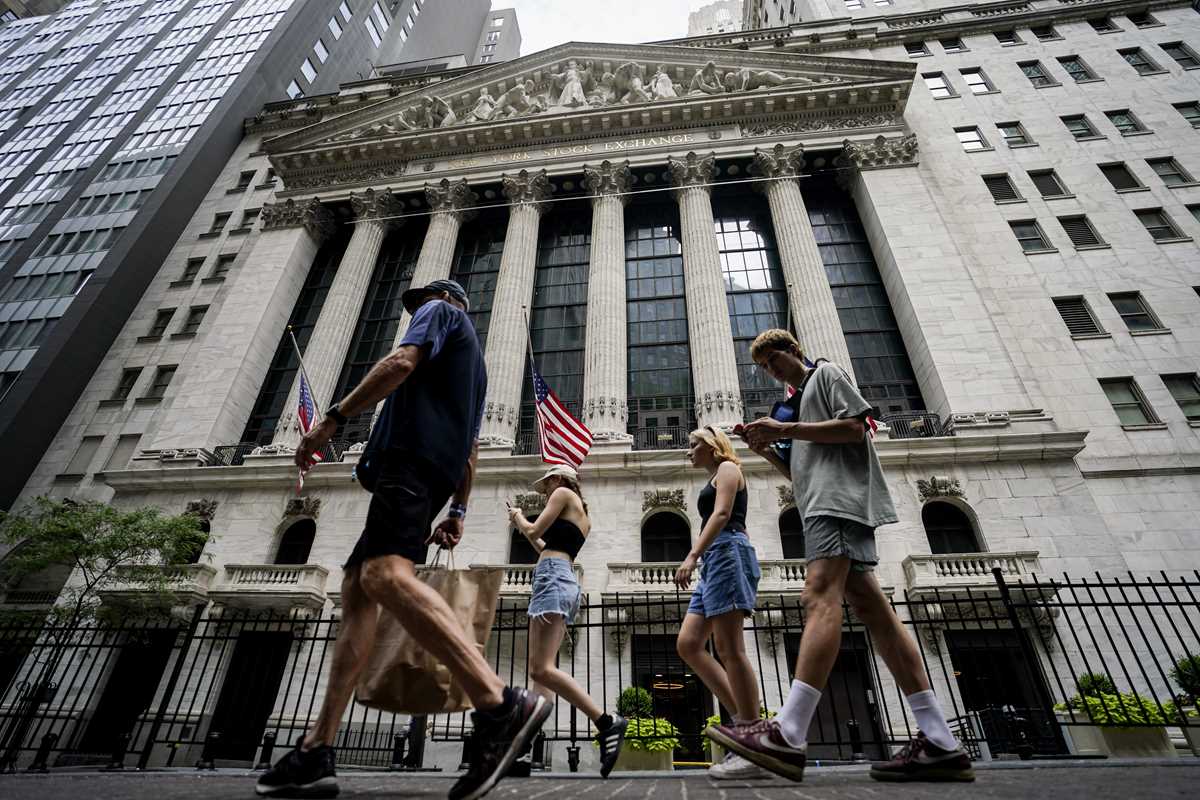 Pedestrians walk past the New York Stock Exchange, Friday, July 8, 2022, in New York. Stocks are swinging between small gains and losses as Wall Street works out what to make of surprisingly strong data on the U.S. jobs market released Friday.
(AP Photo/John Minchillo)
Pedestrians walk past the New York Stock Exchange, Friday, July 8, 2022, in New York. Stocks are swinging between small gains and losses as Wall Street works out what to make of surprisingly strong data on the U.S. jobs market released Friday.
(AP Photo/John Minchillo)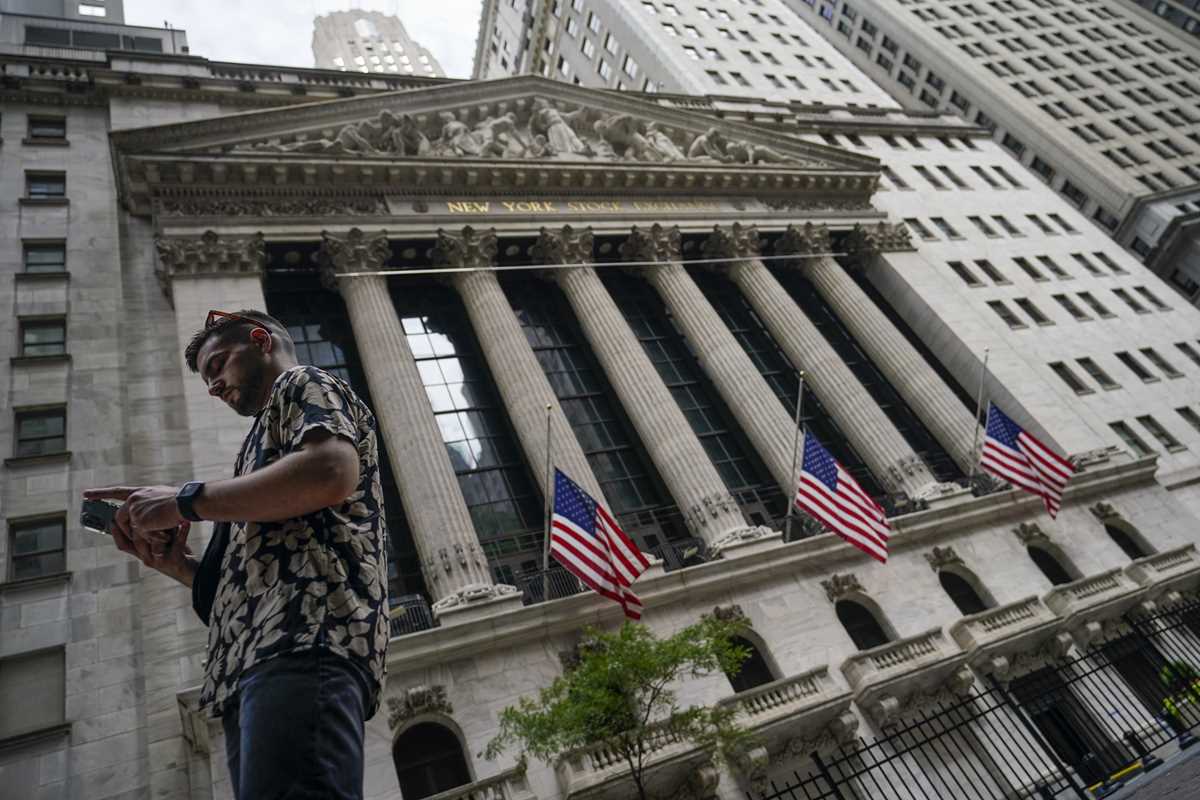 Pedestrians walk past the New York Stock Exchange, Friday, July 8, 2022, in New York. Stocks are swinging between small gains and losses as Wall Street works out what to make of surprisingly strong data on the U.S. jobs market released Friday.
(AP Photo/John Minchillo)
Pedestrians walk past the New York Stock Exchange, Friday, July 8, 2022, in New York. Stocks are swinging between small gains and losses as Wall Street works out what to make of surprisingly strong data on the U.S. jobs market released Friday.
(AP Photo/John Minchillo) A currency trader walks by the screens at a foreign exchange dealing room in Seoul, South Korea, Friday, July 8, 2022. Asian stock markets followed Wall Street higher Friday after two Federal Reserve officials said the U.S. economy might avoid a recession and a news report said China might boost construction spending to stimulate its struggling economy. (AP Photo/Lee Jin-man)
A currency trader walks by the screens at a foreign exchange dealing room in Seoul, South Korea, Friday, July 8, 2022. Asian stock markets followed Wall Street higher Friday after two Federal Reserve officials said the U.S. economy might avoid a recession and a news report said China might boost construction spending to stimulate its struggling economy. (AP Photo/Lee Jin-man)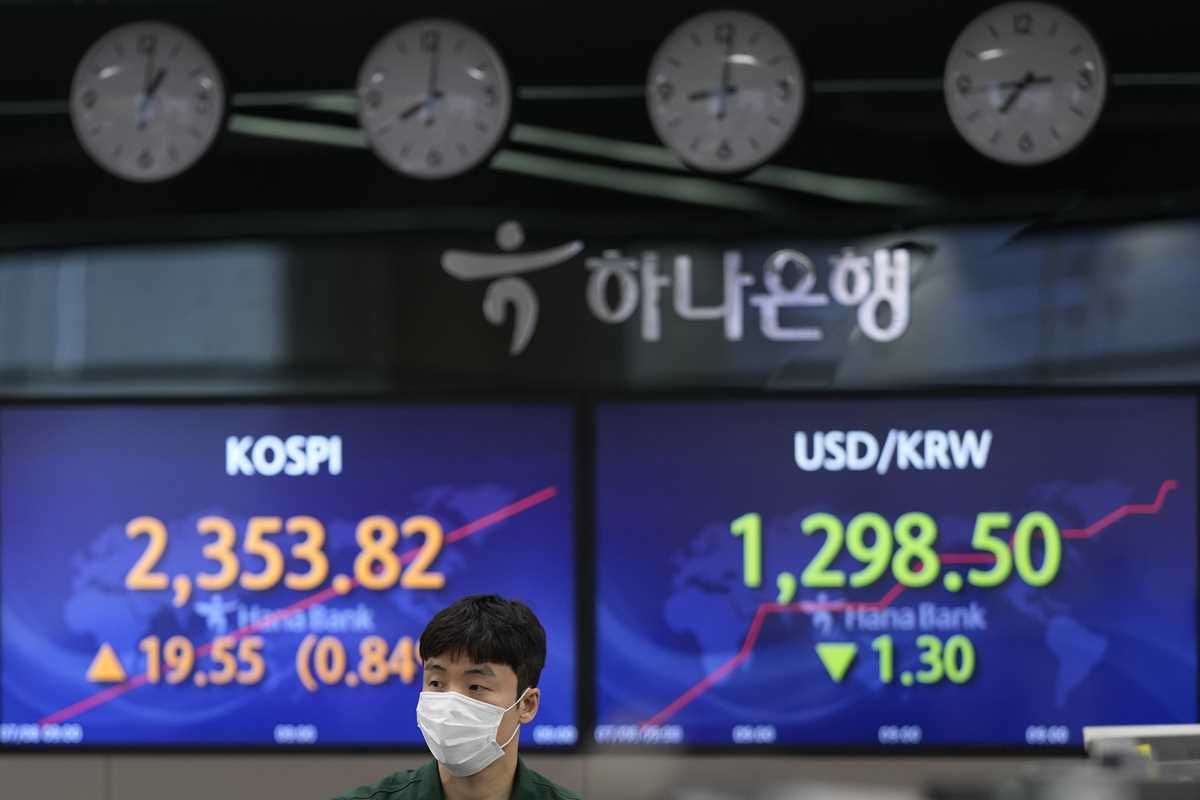 A currency trader walks by the screens showing the Korea Composite Stock Price Index (KOSPI), left, and the foreign exchange rate between U.S. dollar and South Korean won at a foreign exchange dealing room in Seoul, South Korea, Friday, July 8, 2022. Asian stock markets followed Wall Street higher Friday after two Federal Reserve officials said the U.S. economy might avoid a recession and a news report said China might boost construction spending to stimulate its struggling economy. (AP Photo/Lee Jin-man)
A currency trader walks by the screens showing the Korea Composite Stock Price Index (KOSPI), left, and the foreign exchange rate between U.S. dollar and South Korean won at a foreign exchange dealing room in Seoul, South Korea, Friday, July 8, 2022. Asian stock markets followed Wall Street higher Friday after two Federal Reserve officials said the U.S. economy might avoid a recession and a news report said China might boost construction spending to stimulate its struggling economy. (AP Photo/Lee Jin-man) A currency trader talks near the screen showing the Korea Composite Stock Price Index (KOSPI) at a foreign exchange dealing room in Seoul, South Korea, Friday, July 8, 2022. Asian stock markets followed Wall Street higher Friday after two Federal Reserve officials said the U.S. economy might avoid a recession and a news report said China might boost construction spending to stimulate its struggling economy. (AP Photo/Lee Jin-man)
A currency trader talks near the screen showing the Korea Composite Stock Price Index (KOSPI) at a foreign exchange dealing room in Seoul, South Korea, Friday, July 8, 2022. Asian stock markets followed Wall Street higher Friday after two Federal Reserve officials said the U.S. economy might avoid a recession and a news report said China might boost construction spending to stimulate its struggling economy. (AP Photo/Lee Jin-man)NEW YORK (AP) — Stocks are swinging between small gains and losses as Wall Street works out what to make of surprisingly strong data on the U.S. jobs market released Friday.
The S&P 500 was up less than 0.1% in afternoon trading after earlier veering from a loss of 0.9% to a gain of 0.4%. On the optimistic side, employers hired many more workers last month than expected despite worries about a possible recession. However, the hotter the economy remains, the more likely the Federal Reserve is to continue raising interest rates sharply in its fight against inflation.
Treasury yields shot higher immediately after the release of the jobs data, underscoring expectations of Fed rate hikes, but then eased back. The yield on the two-year Treasury jumped as high as 3.15% from 3.03% late Thursday, but it then moderated to 3.08%.
The Nasdaq composite rose 0.1% after swinging from an early loss of 1.2% to a gain of 0.6%. The technology and other high-growth companies that make up a big chunk of that index have been some of the most vulnerable to rising rates recently.
The Dow Jones Industrial Average rose 9 points, or less than 0.1%, at 31,394, regaining some ground from a 172-point decline, while the Russell 2000 index of small company stocks edged up less than 0.1%. The major indexes are on pace for a weekly gain.
The Federal Reserve has already hiked its key overnight interest rate three times this year, and the increases have become increasingly aggressive. Last month it raised rates by the sharpest degree since 1994, by three-quarters of a percentage point to a range of 1.50% to 1.75%. It was at virtually zero as recently as March.
By making it more expensive to borrow, the Fed has already slowed some parts of the economy. The housing market has cooled in particular as mortgage rates rise due to the Fed's actions. Other parts of the economy have also shown signs of flagging, and confidence has fallen sharply among consumers as they contend with the highest inflation in four decades.
The hope on Wall Street had been that the recently mixed data on the economy could convince the Federal Reserve to take it easier on rate hikes. This week's reprieve from spiking prices for oil and other commodities helped strengthen such hopes. But Friday’s jobs report may have undercut them.
The choppy trading Friday comes ahead of a key report next week on inflation at the consumer level. The consumer price index, which in May came in at the highest level since 1981, is projected to show an increase of 8.8% over the 12 months ended in June, according to FactSet.
“I don't think anybody wants to get super long over the weekend going into the CPI,” said Jay Hatfield, CEO of Infrastructure Capital Advisors.
Higher interest rates slow the economy by design, and the Fed's intent is to do so enough to force down inflation. It's a sharp reversal from policy during the pandemic, which was to keep rates low in order to support economic growth. The danger is that rates hikes are a notoriously blunt tool, with long lag times before their full effects are seen, and the Fed risks causing a recession if it acts too aggressively.
“You can’t just raise rates and reduce the balance sheet without it doing the opposite of what it did before,” said Jerry Braakman, chief investment officer of First American Trust. “When you do the reverse, you can expect it will do the opposite as well.”
Other central banks around the world are also raising interest rates and removing emergency plans put in place early in the pandemic to prop up financial markets.
One closely watched signal in the U.S. bond market is continuing to warn of a possible recession. The yield on the two-year Treasury this week topped the yield on the 10-year Treasury and remained that way on Friday. It's a relatively rare occurrence that some see as a precursor for a recession within a year or two. Other warning signals in the bond market, which focus on shorter-term yields, are not flashing though.
Even if the Fed can pull off the delicate task of crushing inflation and avoiding a recession, higher interest rates push down on prices for stocks, bonds, cryptocurrencies and all kinds of investments in the meantime.
Following Friday's jobs report, traders are universally betting the Fed will raise the target for its short-term interest rate by at least three-quarters of a percentage point at its meeting later this month, according to CME Group. That would match June’s big move.
A small number of traders are even betting on an increase of a full percentage point. A week ago, no one was predicting that big a move, and some traders were thinking an increase of just half that was the most likely scenario.
In overseas markets, stocks were mixed or modestly higher.
Tokyo's main stock market index ebbed following the assassination of former Japanese prime minister, Shinzo Abe, but stayed in positive territory for the day. Abe, 67, died after being shot during a campaign speech Friday in western Japan.
The Nikkei 225 edged up by 0.1% after being up by more than 1% before the attack. Abe oversaw an effort to jolt Japan's economy dubbed “Abenomics,” and he stepped down as prime minister in 2020.
On Wall Street, shares of GameStop fell 4.9% after the retailer abruptly ousted its chief financial officer. A day earlier, the stock that shook Wall Street last year after soaring far beyond what professionals said was reasonable had climbed 15.1% after it announced a 4-for-1 stock split.
On the winning side was Costco Wholesale, which rose 1.3% after it said sales at its stores strengthened by 20% last month from a year ago.
___
AP Business Writer Joe McDonald contributed. Veiga reported from Los Angeles.
Before you consider Costco Wholesale, you'll want to hear this.
MarketBeat keeps track of Wall Street's top-rated and best performing research analysts and the stocks they recommend to their clients on a daily basis. MarketBeat has identified the five stocks that top analysts are quietly whispering to their clients to buy now before the broader market catches on... and Costco Wholesale wasn't on the list.
While Costco Wholesale currently has a "Moderate Buy" rating among analysts, top-rated analysts believe these five stocks are better buys.
View The Five Stocks Here
Click the link below and we'll send you MarketBeat's guide to investing in 5G and which 5G stocks show the most promise.
Get This Free Report
